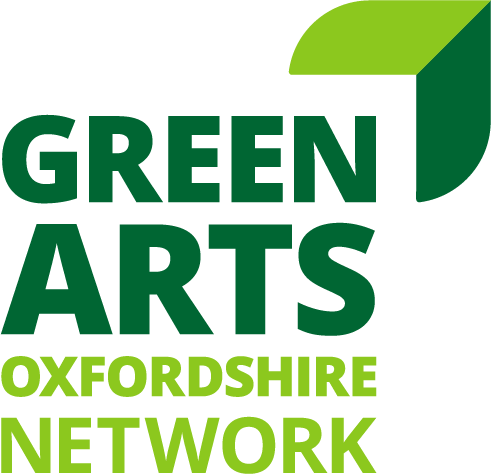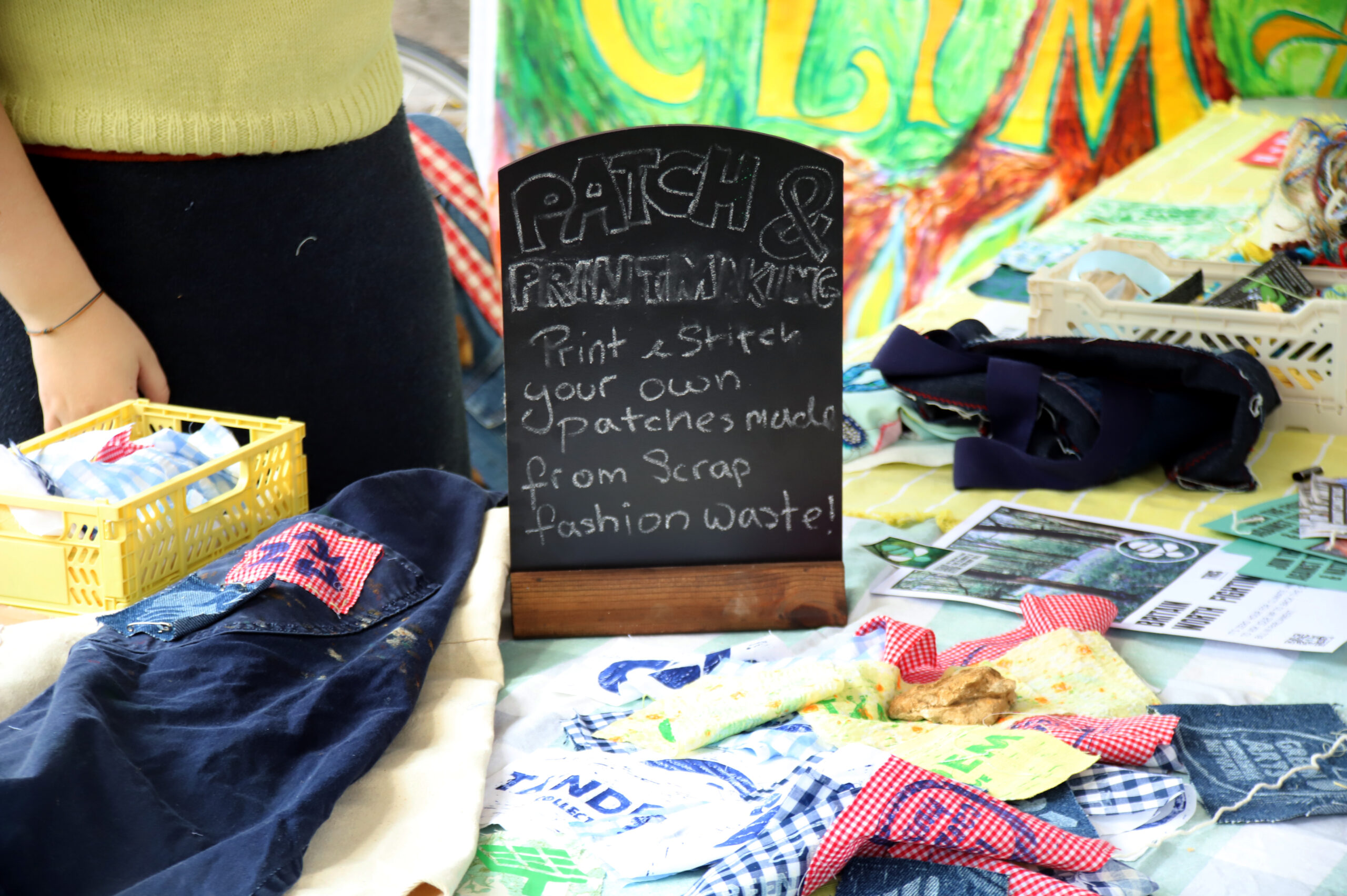What happens when 60 people across the Vale of White Horse do Carbon Literacy Training?
Thanks to the Vale of White Horse District Council’s Climate Action Fund, Green Arts Oxfordshire Network were able to provide 4 funded Carbon Literacy Training sessions to the Vale of White Horse’s creative community. We bookended the project with collective calls to action, starting the series on Carbon Literacy Action Day in December 2023, and ending with a session as part of Oxfordshire Great Big Green Week 2024, which is the UK’s largest celebration of community action to tackle climate change and protect nature.
So what is Carbon Literacy Training?
Carbon Literacy Training equips participants with the knowledge, skills, motivation and confidence to embed positive climate action in their work and personal lives. Our course is catered to Oxfordshire’s creative community, helping participants to measurably reduce the carbon cost of creative projects and creating a cultural shift towards climate justice and a regenerative future.
We provide a full day of training through a self-directed e-learning platform and an interactive training session with a trainer and peers, focused on creative actions that we can take locally to reduce emissions. Learners then pledge an individual and group action that reduces emissions as part of their submission to the Carbon Literacy Project, who award certification that is internationally recognised by the United Nations! Carbon Literacy Training is a brilliant opportunity to take collective action as part of a movement that is making a huge combined impact.
The sustainability consultancy firm Jacobs did a study on the effectiveness of Carbon Literacy training, and discovered that there is between a 5 – 15% carbon saving per person for those that undertake the training. A study at the University of Leeds also found that Carbon Literacy is an effective way of instigating lasting change.
As part of this project, we played a part in training the first 100,000 Carbon Literate Citizens around the world!
What did we learn about how Carbon Literacy Training affects people?
People connected over a shared issue…
“It makes a big difference being part of a group. It’s encouraging to see & hear other people taking the trouble to learn & share their experiences. We are all in this together so we really do need to collaborate. Carbon Literacy Training is an excellent way to step up, get informed & commit to making changes.”
Participants were surprised to learn something new…
“I would consider myself someone with a good degree of awareness about the climate crisis and crisis solutions, but I learnt a lot, including some surprising things, from this training. It was detailed, engaging, and easy to follow, and the willingness of the group to share resources and perspectives was really valuable.”
“I’m amazed how much information was conveyed in a manner that was easy to assimilate.”
“A vital certification to have in your back pocket for all projects and organisations. Well worth completing to confirm what you already know whilst giving you the extra boost of inspiration that the world can be changed for the better.”
It was a source of much-needed hope and motivation…
“This is vital training for all people. It becomes clear the actions we need to take in our lives, work and communities. It left me feeling optimistic and powerful.”
“I came out of the training feeling empowered and motivated. It provided me with all the facts and stats to equip me to challenge both my own and other people’s practice.”
“Excellent training on what is certainly a difficult and overwhelming subject. A healthy amount of focus on positive change left me with a feeling of hope, not dread as I had thought might have been the case. I feel more informed not just about climate change but more importantly about the positive steps I can take to do my part in it.”
It gave learners the confidence to speak up and take action…
“My attitude has certainly changed and I feel more confident to enter into conversations. I have also been able to implement new thinking into my workplace.”
“The training was excellent and wonderfully delivered. I learned new facts and solutions that day and new vocabulary to better speak about this topic in my practice and the community with which I am involved. Thank you!”
“One of the most important things you’ll ever do is to complete a carbon literacy course! powerfully, informing, and unafraid to speak truth to power!”
“I’m glad I decided to take this training. The materials provided by the organizer has been invaluable in deepening my understanding of the complexities surrounding carbon footprint and climate change. It has also empowered me to play a more active role in shaping a sustainable future. I am truly grateful to the organizers for their dedication to raising awareness and catalyzing positive change within our communities.”
What pledges did people take as a result of the training?
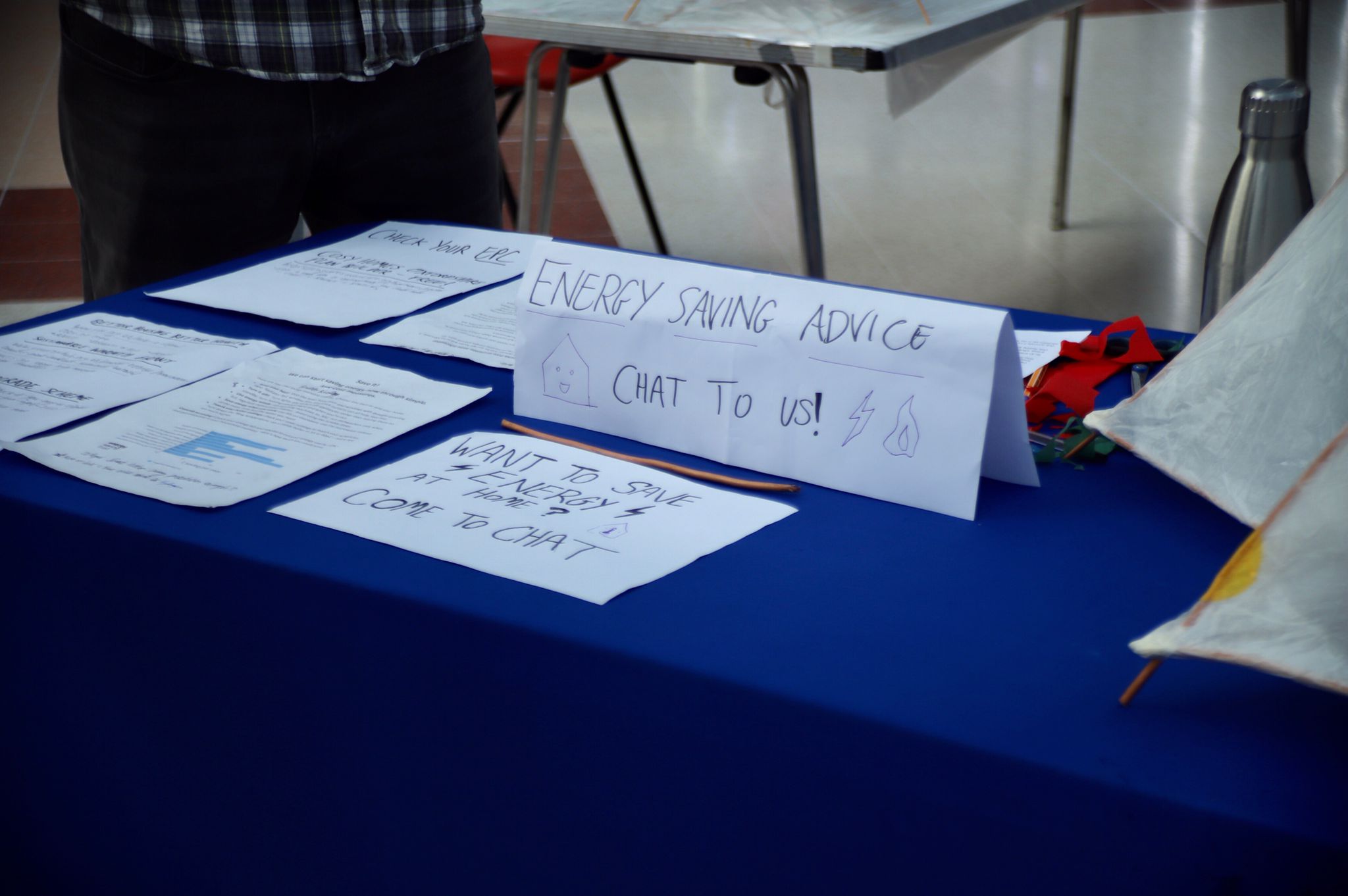
A Creative Energy Workshop held by Fusion Arts as part of Oxfordshire Great Big Green Week in 2022. Photography by Feng Ho.
Changing the way we use energy…
“Look for funding for an energy / carbon emission audit for our event.”
“I commit to reducing carbon by researching and using a greener energy supplier for my home which accommodates myself, two teens and occasional theatre artist lodger, and a theatre storage area.”
“I will talk to the landlord of my studio and my home to get renewable energy in the space- installing solar panels or switching to a renewable energy provider. I will also switch to led lights.”
“Investigate and question climate action and energy efficiency (including heating and cooling; natural lighting; waste management) of venues for events in community settings. Include these factors, with other key non-climate related factors, in selecting venues to use for work events.”
“I’ll install solar panels on my home.”
“I already buy “green energy” but I suspect the company I use does use the REGO certification so I will investigate switching to one of the three true green energy suppliers when my current contract expires.”
“Look to change to a green energy supplier for home energy and in the next year look to change my heating system to green source.”
“As trustee of Harwell Village Hall we have already installed solar panels to limit the use of electricity from the grid and make as much of our own as possible, selling true green energy back to the grid. Our next step is to take advantage of the Oxfordshire Local Government Initiative to install EV chargers in the car park at the village hall. We will investigate the use of air source heat pumps to move away from using gas – our goal is to be net carbon zero as soon as is feasible. In the interim we will investigate ways of improving the efficiency of our heating in the hall such as destratification fans in the hall that doesn’t have an AHU system (one does, one doesn’t).”
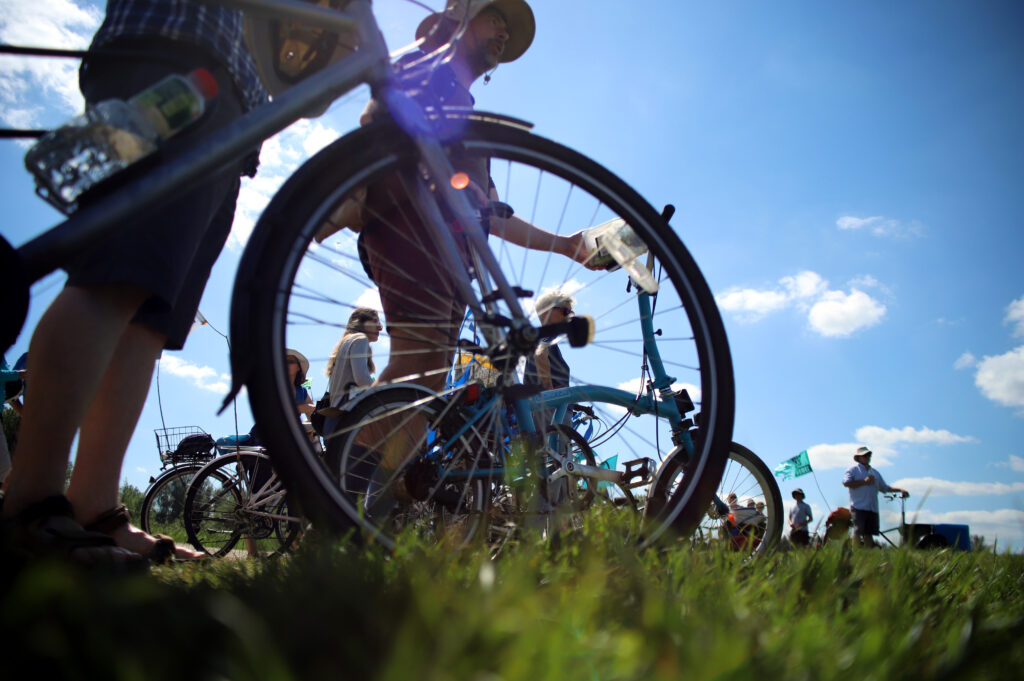
Bike Swarm in Oxfordshire. Photography by Feng Ho.
Changing the way we move…
“I commit to reducing carbon by setting up a Car sharing platform for the Artists and Production staff to use during travel to and from festival site during the festival season. We are a company reliant on car transport as the site cannot be accessed by any other means of travel (at the moment!), therefore it is essential that car usage is maximised. This action will involve support from the company manager and production manager of each production (x5) running during the season. We will need to research and develop a platform that will suit our needs.
Currently the company includes 100’s of personnel travelling independently from various locations throughout London and the South East to the Cotswolds at various stages during the season. Previously this has been up to individuals to work out with no central place of contact for personnel to communicate and navigate sharing journeys. I want to encourage this communication and provide a space where sharing journeys can be made possible and normalised. If this is successful, it may be something we could then extend to our Audiences.”
“I will hold a bike maintenance and security day with volunteers and staff.”
“Investigate and develop transport options that reduce fossil fuel emissions for elderly and disabled audience members to get to event venues, including public transport, community transport, car sharing, and active travel options. Lobby for improved public and community transport where possible. Encourage car sharing arrangements while taking account of risks. Provide information and encouragement for audience members to try different options.”
“We will develop a Green Production Agreement, incl. a sustainable travel plan for our latest touring production.”
“I will be reducing my overall weekly car travel by 50% by cycling to work and back each Saturday for my next term of employment.”
“I will be getting in touch with my colleagues and propose that I will be emailing our overseas employer and requesting that my return flight (paid for by them) is changed to train journeys and I will clearly outline my commitment to reducing carbon emissions so they know the reasons. I will hope that the rest of my group feel they can also request this through me leading the way.”
“Joining a campaign movement demanding for rail transport across Europe to be more affordable, especially compared to aviation, which is often much more affordable to travel across Europe, which is a necessity for my work. Financial barriers are currently in place in that sector for those, like myself, wishing to reduce the impact of their travel and making rail transport unaffordable. Such a campaign will advance the need for and implementation of new regulations and, therefore, reduce travel by plane and increase travel by rail, leading to a much lower carbon footprint and less greenhouse gas emissions.”
“Work locally or digitally rather than sending work internationally which may use air miles.”
“I am going to fly less.”
“Commitment to Stop Flying!”

‘Art of Protest’ at One Planet Abingdon, documenting the activism of an Indonesian environmental group Fossil Free Jogja. Part of the ‘Creative Climate’ programme conceived by Feng Ho, with assistance from Munir Al Sachroni, Malcolm Atkins and One Planet Abingdon. Photograph by Feng Ho.
Increasing awareness and inspiring others…
“I have passed on my acquired knowledge to my colleagues and will setup surveys that seek to find out more about transport habits and how we can offer more Active travel.”
“To create artworks for an exhibition which brings to the attention of the public the devastating effects of climate change and global warming. Use the creative arts to highlight global warming and climate change and its effect on the environment, people and planet. Give a talk about my artwork/exhibition in relation to climate change and its devastating effects.”
“Conducting art workshops specifically on climate change through making sustainable sculptures.”
“As editor for the Harwell News I will write an article on Carbon Literacy Training and provide links to the information to help our readers to make better decisions about their carbon footprint.”
“I am part of the community project The Gardening Drawing Club, which provides free arts and horticulture workshops to adults and children in Britain. We promote veganic (organic + vegan) gardening methods with a lower carbon footprint. My new action in a group setting is to create a new page on The Gardening Drawing Club’s website that lists our plan of action to reduce our carbon footprint so that it is shared with our audience and inspires others. Our plans (already in action) are using second-hand or recycled materials, public transport and hybrid vehicles for transportation to the locations where the events take place, and a local organic plant-based diet (including in our free events).”
“Incorporating what I’ve learned in my public facing art practice and also in community workshops. In particular I’m planning on making a stop motion video to raise awareness of Carbon Literacy and Climate Change. I’m facilitating a stop motion workshop in January as a community event and planning to use this opportunity for discussion on climate change and what people can do. And of course making a community stop motion project about reducing our carbon contributions.”
“As a volunteer of a climate hub, I will set up a mindfulness group/walk in nature to support people’s mental health and support people in managing climate anxiety.”
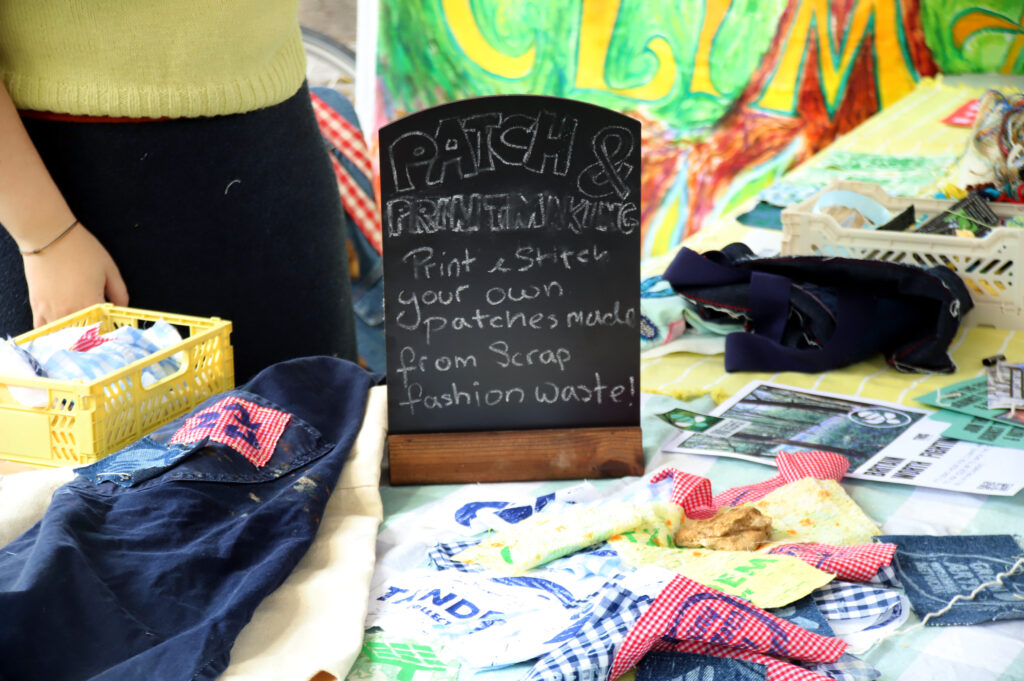
Waste textile printmaking and mending stall with artist Mia Moores as part of Oxfordshire Great Big Green Week 2022.
Choosing more sustainable materials and suppliers…
“I will concentrate more on reusing and recycling materials in my practice but most importantly on all workshops I conduct.”
“As a practising artist, I pledge to commit to reducing my paper waste to zero by producing new paper from all the paper waste I generate. This includes paper waste as a direct result of the production of my artistic work, as well as all other aspects of my life (documents, letters, receipts, paper packaging of food and other goods, cardboard boxes, newspapers, etc).”
“As a creative practitioner working in community learning projects across heritage, charity and arts settings, I pledge to:
- Only use material in the delivery of my work that is recycled, second hand or would otherwise be thrown away.
- Where point (a) is not possible, to only purchase alternative materials that can be fully recycled.”
“Investigate climate action/impact of suppliers and select low impact where ever possible, eg printing (only as necessary), food and drink (seasonal and local as far as possible).”
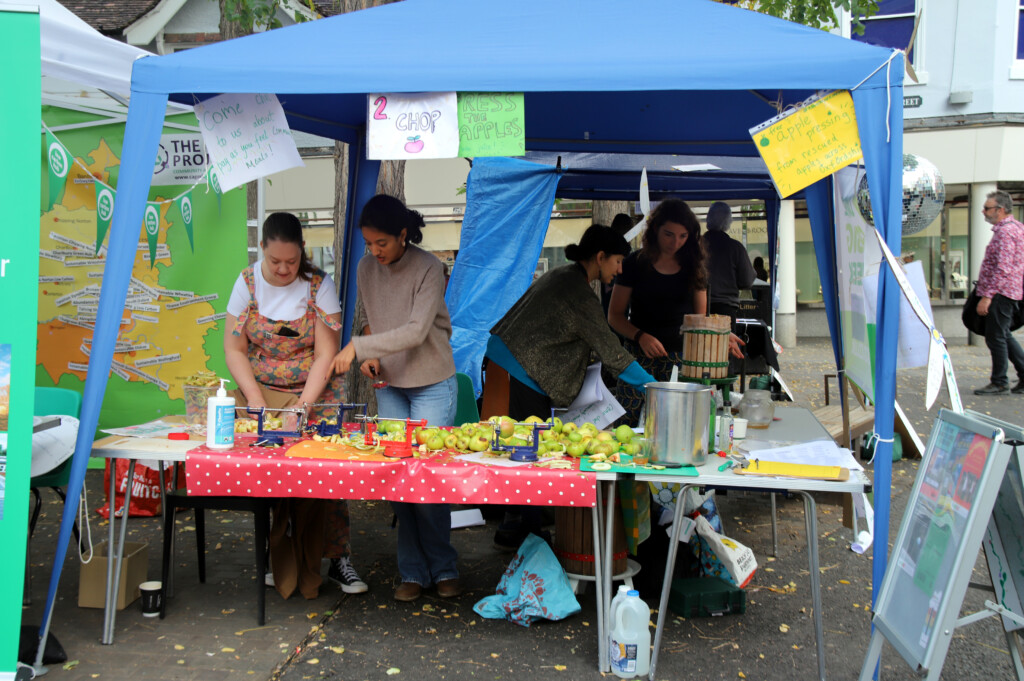
Abundance Oxford apple pressing surplus fruit.
Thinking differently about what we eat…
“Look to book more or solely vegan and vegetarian food options at our event.”
“Growing a backyard family garden of plants and food each summer.”
“I will reduce my meat intake (particularly beef and lamb) and change towards a more plant-based diet. I will sign up to Too Good to Go to reduce food waste from restaurants and my own diet.”
“Changing diet from animal products to plant based foods. Eliminating Beef and Lamb and reducing dairy consumption.”
Thinking differently about finance…
“I will ask about the use of my pension and where these funds are investing, advocating for these to be directed away from fossil fuel industries.”
“Switch to an ethical bank.”
Putting action into policy…
“We will work with the board of trustees and management team, to create an environmental policy, including a framework for sustainable procurement and a sustainable travel policy.”
“We will create a climate action plan for the climate emergency centre – we have not done this yet due to demands on the day to day running of it. We are getting busier and busier and so will be good to create and implement now that we have many volunteers who can contribute and learn whilst doing it.”
How did people get on with the pledges?
Almost one year later, we got back in touch with the alumni to check in on any progress or updates to the action pledges they had made. We heard stories of success, and in some cases learnt about the challenges that come up…
Action pledge: “Encouraging a significant reduction of meat options served in catering for events at my work.”
Update: “This is done. Not just a reduction, but everything my project is involved with is now no meat. Thank goodness. And there’s been a ripple effect, with others following suit.”
Action pledge: “Research switching to a more responsible energy provider, such as Ecotricity.”
Update: “We use Ecotricity at home.”
Action pledge: “Create an actionable manifesto at the start of my research to be followed throughout. This will need to be cumulative of my own actions and those who I work with during research projects. To become an ongoing manifesto for all future projects.”
Update: “This is going to be an ongoing thing within my research. But so far on the manifesto (in no order):
- All travel to and from [location] must be by bus or train, or at very least carpooling. I will not go alone in my car. All conference travel will all be my public transport too.
- All materials and printouts used during workshops that involve participants must be with recycled materials. E.g. Using recycled paper that I can make myself rather than buying new. The university requires some handouts so I’m encouraging use of these recycled materials.
- My research has changed from involved workshops that create waste to finding a way of doing the same thing be simply with walking so little to no waste will be created. All comms is via email.
Will be continuing to add to this throughout and when my practical research begins, this will be formalised to send to participants to suggest they do the same. Alongside this, I will be calculating carbon whenever I can to transparently report on this at the end.”
Action pledge: “Reviewing my current accounts and making changes were needed. I want to lead by example for anyone I work with.”
Update: “I have switched bank accounts so moved away from Santander which was the big one for me. I also set time each month to go through email accounts to try to reduce that digital footprint.”
Action pledge: “Striving to find sustainable alternatives to buying new when sourcing items for our Drama productions (borrowing items from our local networks, upcycling existing items, sustainable procurement – not just relying on the ease of Amazon. Local charity shops and salvage stores. Hiring.) Considering the life of items and materials beyond the show at the beginning of our design phase – how will they get reused or repurposed? Sharing this initiative with our show Directors.”
Update: “This still needs much work. We reuse and hire/borrow when we can. Sustainable planning / approach still not really built into the process.”
Action pledge: “Reduce my own consumption of dairy products. I already eat very little meat. Seek out plant-based alternatives which will maintain good health.”
Update: “Ongoing.”
Action pledge: “Finding quotes for, and then buying reusable polycarbonate pint glasses to replace the “compostable” cups used on our bar at our venue. Our current stock of cups will be used first; we will continue to send them to composting facilities via First Mile.”
Update: “We have purchased and now (re)use polycarbonate pint glasses.”
Action pledge: “Install a heat pump in our family’s small terraced house.”
Update: “We tried as best we could to obtain planning permission for a heat pump. We submitted two applications, but both failed on the grounds of ‘noise’ and being too close to neighbours. (Which makes me cross, because heat pumps are far quieter than a) traffic in the road, and b) roaring gas boilers when they fire up!!!). But we’re going to keep trying, and we’re also taking advice about solar panels, in the hope we might have a suitable roof (despite nothing south facing and it not being very big!). Fingers crossed.”
So what’s next?
Carbon Literacy Training is just the start of an ongoing journey, equipping learners with the knowledge and tools they need to understand how we can best reduce our personal contributions to climate change. Through pledging to take action as a Carbon Literate citizen, we have a huge collective impact alongside the 100,000 plus people trained worldwide. The Carbon Literacy Project has estimated that 137,000 tonnes of CO2e have been saved as a result of the actions pledged by Carbon Literacy learners in 2024! We can do more, if we all band together, so let’s keep learning, sharing and collaborating.
Green Arts Oxfordshire Network are excited to have received funding from the Vale of White Horse Climate Action Fund again, to hold a series of Creative Climate Action Conversations, creating a short series of events that creatively explore sustainability topics, issues and solutions with Oxfordshire’s arts and culture community. The project begins with an in-person Carbon Literacy Training!
Join the growing alumni network of Carbon Literate creatives by booking a free place in our open call Carbon Literacy Training cohort, for World Environment Day on the 5th of June 2025.
